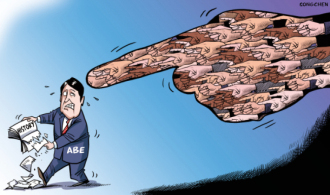Time to stop people monkeying with the law
By Harvey Dzodin (China Daily) Updated: 2016-02-17 08:08
 |
|
A gavel in a court. [Photo/IC] |
The beginning of a new year is a time for reflection and the Year of the Monkey is no exception.
President Xi Jinping has proven to be a man of his word in fighting corruption, continuing to hunt down many tigers (senior officials) and swatting away swarms of flies (lower-ranking officials). But there is another segment of the population that requires attention. As the cartoon character Pogo said, "We have met the enemy and he is us".
Many people in China appear to have little or no respect for law, and reflect the attitude of Bumble in Charles Dickens' Oliver Twist that "the law is an ass".
Xi has pointed out that "strong and effective law enforcement builds a strong nation, while slack law enforcement weakens a nation". This clearly applies to people at all levels.
Disrespect for the law is a cancer in any society.
For example, one of the things that many drivers in large metropolises detest are traffic jams and their inconvenience. Yet one of the main causes of traffic jams is drivers cavalierly flaunting the rules and making an ass of the law.
The worst offenders are drivers who delight in "playing chicken" with pedestrians and bicycles, seeing if they get out of harm's way in time. It appears that these drivers see the lives of others as worthless as the laws that they are knowingly flaunting. And that includes the growing legion of drivers texting while driving, a behavior proven to be as deadly as drunken driving. If people feel contempt for these simple safety rules, they probably feel the same for other more important ones as well.
Observing this sad state of affairs doesn't take sophisticated surveillance equipment. As malaprop-meister Yogi Berra once said: "You can observe a lot by watching." Just stand momentarily at any intersection and watch how many laws are broken. Notice how the good people who play by the rules are delayed or inconvenienced by the lawbreakers.
Imagine what would happen if these drivers were fined for breaking the law, and that after repeated violations their licenses were suspended for a period of time or their cars impounded. Driving is a privilege to be earned, not a right. Surely, using this carrot-and-stick approach their behavior would begin to change. Variations on this theme have been successful elsewhere, so why not here?
China is in an excellent position to catch lawbreakers since many cities have sophisticated traffic camera technology. Imagine what the additional use of drones could do to make this process even more effective. And by installing RFID chips or barcodes on each car, the guilty could be easily identified and ticketed in a very visible way that tells the public that laws are indeed enforced and that there are ever-rising costs for disobeying them.
Traffic law enforcement results in behavioral change, orderly roads, civility, and also generates significant revenue.
I've been told that violators of such simple laws aren't punished because governments "don't have the political will" to do so. But that was before Xi's campaign and before the Fourth Plenum of the 18th Central Committee of the Communist Party of China in 2014, which for the first time in the Party's history had rule of law as its central theme.
Respect for the law is crucial to achieve the Chinese Dream, for the simple reason that if people don't obey laws, it also means that they don't respect the laws or those who made them. Enforcement brings compliance and order, if not respect.
Without enforcement and compliance, some people will continue to flaunt the law at street level, and that many in more lofty places will put their energies into workarounds, and not into building a better and more orderly society through the rule of law.
It's high time to get serious and stop people monkeying with the law.
The author is a senior adviser to Tsinghua University and former director and vice-president of ABC Television in New York.











